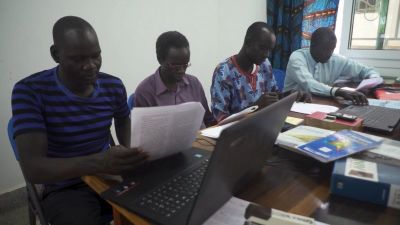
I keep three glass jars in my office. One is full of red beads, the other is mostly full of yellow, and the last one has a small layer of green. The red beads represent 80% of the world’s population, the number of people who have access to the whole of God’s Word in their language. The second jar contains yellow beads for those that have either a Bible translation in process, some part of Scripture available, or an entire New Testament.
And then there’s the jar of green beads.
Representing only 3% of the population, this last jar is a visual reminder of the men, women, and children who still do not have access to God’s Word in their language.
Though this number can feel daunting, I’m encouraged by how God is inspiring and equipping local churches in furthering Bible translation efforts around the world.
The shifting role of local churches around the world
Local churches play a critical role in Bible translations because they see the need within the community that sparks a desire for others to know God. Plainly put — the translating process becomes personal. When a local church is involved in translation, participation leads to active use and life transformation.
When people engage with all of Scripture, understand it, and digest it, what we end up seeing is discipleship within the church. Personal growth leads to church growth.
In a recent study, YouVersion, a nonprofit digitally connecting people all over the world to God’s Word, reported daily usage of the Bible increased by 20% in 2023 compared to the previous year, confirming a growing number of people interacting with the Bible each day. What we see in our translation work correlates with this data.
God has uniquely positioned the local church to share His Word with their neighbors. A wonderful example is in Madagascar, where a large local church has started to translate the Bible and asked Wycliffe Bible Translators to play a supporting role. They desire to reach their entire island and then take God’s Word to other island nations in the Indian Ocean and on to East Africa. How blessed are the feet of those who bring good news.
A new role for Bible translators
As Bible translators, our goal has never been simply to translate the Bible for its own sake. Though we’ve been tremendously blessed throughout our existence by the ability to offer God’s word to millions of people, what we truly want is for lives to be transformed through a relationship with Jesus Christ, the Son of God.
With local churches increasingly leading the way in translation work, translation agencies have a different role to play now. No longer the primary advocate, Bible translators must assume a posture of humility and be an integral and supportive resource for the local churches doing the bulk of the work.
Through our network and years of experience, we’ve been able to develop a set of materials that breaks Scripture down into digestible sections. A process of familiarization, internalization, and articulation was created so people groups with a minority language could have an oral Bible translation. We also coach and advise, and have even started to translate our translation resources.
Recently in Nigeria, two lead pastors came up to us with appreciation but said, “With or without you, we’re going to do this,” referring to translating the Bible into their language. They wanted Wycliffe to partner with them, but their call from God was clear. The translation was their ministry and their responsibility. What a joy to see God move in such a powerful way! What a privilege it is to be able to come alongside them to help them carry out the call of God on their lives.
Challenging the role of churches in the West
For decades, the role of the Western church in Bible translation was to send workers out to do the work. This has contributed to the fact that the epicenter of the global church has now shifted to the South and East. Following this trend, Bible engagement is decreasing in the West and North, but it’s increasing in other areas of the world. All of this sets up churches in the West to play a supportive role as others take the lead in translation efforts.
There’s a reason why the small number of green beads in my jar hasn’t changed much in recent years. They represent the areas where Christians are highly persecuted, are small in number, and where the people are under severe economic stress and extreme political unrest. Only God can make a way in these areas, and I want to challenge individuals in the U.S. to support Bible translation efforts through consistent and fervent prayer — it’s the most important way you can partner with us in this work.
I also want to encourage churches and leaders to learn, share, and celebrate where translations are being completed. Tell others about this exciting work. And as a church, pray with purpose for unreached people in the world.
Compared to the red and yellow beads on my shelf, the green jar looks almost empty. We are reaching so many with God’s Word, but there’s more work to do. God has gifted His local church to do this work — both globally and from right where you are.
Andrew Flemming is the Vice President of Global Partnerships Engagement at Wycliffe Bible Translators.

No comments:
Post a Comment